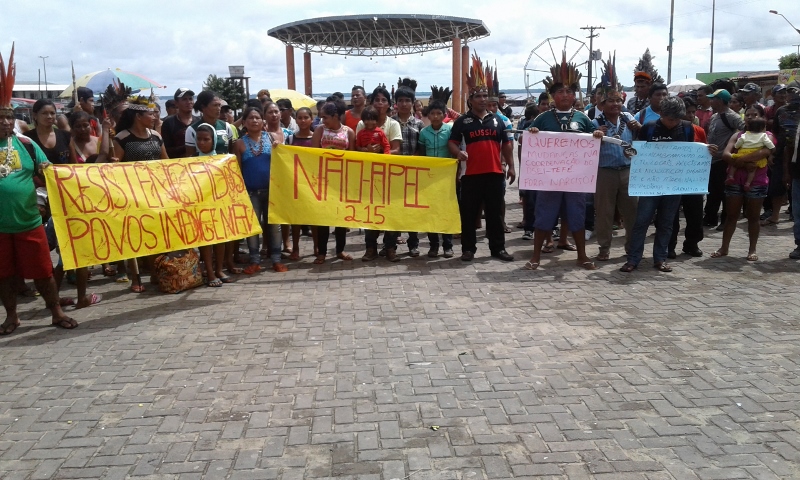Spotlight on Brazil: protecting indigenous peoples
Esther Gillingham is CAFOD’s Brazil Programme Officer. As the Olympic Games get underway in Rio, this World Indigenous Day (9 August) Esther turns the spotlight on our work with Brazil’s indigenous peoples.
Brazil is once again under the world’s spotlight. Just two years ago, Brazil spent roughly USD3.6bn of public money on stadiums for the 2014 World Cup. Now, when 25.8 million Brazilians live in poverty, and the country is experiencing its worst political and economic crisis in decades, Brazil is hosting a second mega sporting event: the Olympics in Rio de Janeiro from 5 to 21 August.
7 facts about Brazil you probably won’t hear at the Olympics
Brazil’s most vulnerable
In preparation, an estimated £3.8bn of taxpayers’ money has been spent and 77,000 people have been evicted from their homes. Here in the UK, I’ve found it difficult to ignore the headlines about the Zika virus, entrenched political corruption, and Olympics-related security breaches. But we rarely, if ever, hear about the threats posed to Brazil’s poorest and most vulnerable people.

9 August is the United Nations International Day of the World’s Indigenous Peoples – a moment, according to Ban Ki Moon, to “call on the international community to ensure that they are not left behind. To create a better, more equitable future…[and] commit to do more to improve the health and well-being of indigenous peoples.” Earlier this year, the UN Special Rapporteur for Indigenous Peoples highlighted a crisis is on the horizon for Brazil’s 896,917 indigenous people, who face risks to their lives, that “are more profound than at any time since the adoption of the Constitution in 1988”. These risks will only be compounded by the impact of the games.
Read how we are shining a light on Brazil this Olympic Games
Instead of prioritising protection of indigenous people as the guardians of the lungs of our planet in the Amazon rainforest, Brazil’s interim government is implementing austerity measures, cuts to public policies, and constitutional amendments that aim to boost economic growth while destroying indigenous lands and livelihoods. This exploitation and commercialisation of natural resources is opposed by many indigenous people, due to a deep-rooted spiritual connection with nature.
Threatened and attacked
Some national media channels have fuelled anti-indigenous discrimination, presenting indigenous peoples as a barrier to economic progress. As a result, indigenous peoples are murdered, criminalised, threatened, evicted from their land, and their rights to health, education and to maintain their different cultural identities are systematically violated.
CAFOD’s partner, CIMI (Indigenous Missionary Council), which works to protect indigenous rights throughout Brazil, records that in 2014 there were 138 murders of indigenous people due to internal conflicts through contact with non-indigenous people, or land disputes. Indigenous communities also increasingly experience the impacts of climate change, such as droughts and floods.
In this short video hear from Davi and Mauricio who are Yanomami indigenous leaders from our Brazil partner the Hutukara Yanomami Association (HAY):
Despite Brazil’s ratification of the International Labour Organisation 169 convention on indigenous peoples, which requires governments to protect the rights of indigenous people, Brazil is actively violating protection mechanisms. Budget cuts of 33 per cent to FUNAI – the Federal Indigenous Affairs Agency that serves to protect indigenous rights and lands – have led to a weakened and ineffective public body, further denying the most threatened communities their right to either consultation or representation.
CAFOD has been supporting indigenous partners in Brazil for over 30 years, empowering indigenous communities to demand their rights to land, education, and health. Working in the Brazil programmes team at CAFOD, I have seen first-hand how our partners’ training, lobbying and advocacy have contributed to building a strong, united, and politically engaged indigenous movement, and together we are improving the lives of the most threatened indigenous communities.
Find out more about our work in Brazil
Five months ago, 2,030 Yanomami and Ye’kuana people in the Amazon were affected by the worst droughts and fires in 20 years, due to El Niño. Many had lost their homes and had no way to feed their families or access safe drinking water. In response, CAFOD supported an emergency project in partnership with ISA (Socio-Environmental Institute) and HAY (Hutukara Yanomami Association), distributing 245 food parcels, 119 kits of agricultural tools, and 76 water filters to 14 of the worst affected indigenous communities. Rains have since arrived and communities are planting crops again.
Giving indigenous communities a voice
And in Amazonas, many indigenous communities are discriminated against, and have no political voice or representation to ensure their constitutional rights are guaranteed. Last month, in partnership with CIMI and Caritas Tefé, we began a three-year €550,781 European Union and CAFOD-funded project to politically train indigenous leaders to participate in decision making and advocate for their political and civil rights.
Support CAFOD’s work with indigenous partners in Brazil
But we can’t stop here. Now, more than ever, we need to increase our support to Brazil’s indigenous movement to protect their lives, rights and lands. Once the lights go out at the closing ceremony in Rio, may we all embrace Pope Francis’ call to action in Laudato Si’:
“…it is essential to show special care for indigenous communities and their cultural traditions… For them, land is not a commodity but rather a gift from God and from their ancestors who rest there, a sacred space with which they need to interact if they are to maintain their identity and values. When they remain on their land, they themselves care for it best.”
Pray for the poorest communities in Brazil
Reblogged this on CAFOD Plymouth's Blog.
Reblogged this on CAFOD Plymouth's Blog.
Great piece, but did you mean £3.8bn of tax payer’s money rather than £3.8m?
Great piece, but did you mean £3.8bn of tax payer’s money rather than £3.8m?